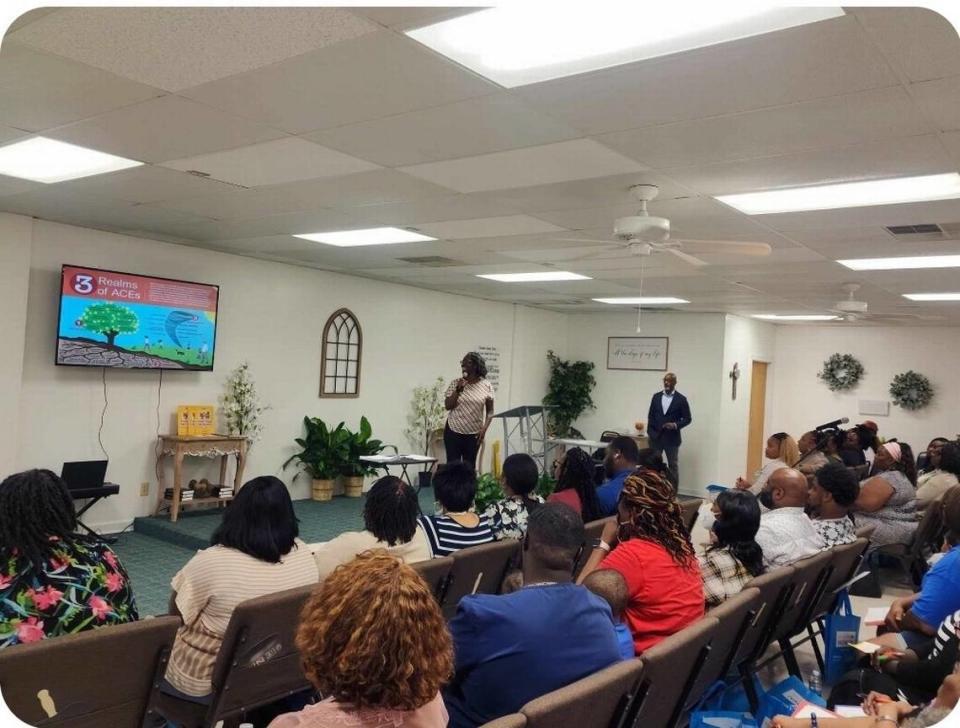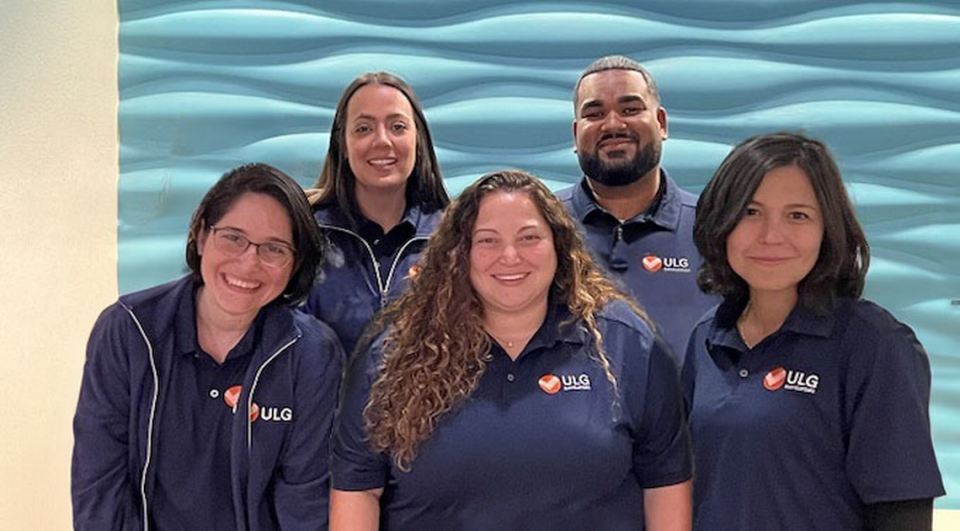Medicaid expansion will take effect in weeks. Here’s NC’s outreach strategy
Community organizations serve a pivotal role in the state’s plan to spread the word about the upcoming Dec. 1 launch of Medicaid expansion in North Carolina.
The state Department of Health and Human Services estimates that over 600,000 North Carolinians will become eligible for this federal-state insurance program, which will now cover all adults in the state who make below about $20,120 a year.
Of those, about 300,000 North Carolinians — largely those on a limited-benefit, family-planning Medicaid program — will be moved into full coverage on Dec. 1, the day announced in late September by DHHS and Democratic Gov. Roy Cooper as the official launch.
The remainder of people, as they learn of expansion, will need to sign up for coverage.
But these eligibility figures are estimates pulled from demographic data and Medicaid enrollment data, DHHS officials said.
A concrete number of people who will become eligible and enroll is unknown. According to DHHS leaders, identifying and reaching as many people as possible who will become eligible will hinge in large part on the work of community organizations. Once expansion actually launches, more dependable data will also become available, allowing community outreach strategies to be tweaked, officials said.
Meanwhile, DHHS, a cabinet agency under Cooper, is leading communication efforts.
“I think our role is to help the (community) organizations understand what the quote, unquote, rules of the road are, in terms of how you communicate and what you can say to people as they try to get eligibility,” said Jay Ludlam, deputy secretary for NC Medicaid.
“We provide that clarity, and then allow those community partners to tailor the message for the community that they’re speaking to,” he told The News & Observer.
DHHS launched in early October a new website with a toolkit of resources for organizations to spread the word to their communities. This toolkit, according to a news release, “is the first phase of the state’s outreach efforts and includes new English- and Spanish-language resources to help educate North Carolinians on eligibility and how to apply.” Flyers, social media content and more on Medicaid expansion are shared on this website.
North Carolina will soon provide coverage to more people through Medicaid. You may be able to get Medicaid even if you didn’t qualify before.
️Go to https://t.co/i7riZiGVz5 to learn more. pic.twitter.com/WzAUzdXFFs— NCDHHS (@ncdhhs) October 6, 2023
A DHHS spokesperson said the budget for the initial communications toolkit is $100,000, which includes the suite of materials that will be revised and expanded throughout an 18-month outreach effort.
Ludlam said the state did not fund on-the-ground outreach efforts, nor did DHHS request that funding. These efforts will need to rely primarily on philanthropic organizations, he said.
“I think that by having the flexibility at the ground with these organizations themselves bringing the funding, that it’s been more tactically effective in being able to reach those communities,” he said.
In terms of reaching and identifying community partners, Debra Farrington, chief health equity officer at DHHS, said many relationships with organizations were established during the COVID-19 pandemic, when many North Carolinians relied on trusted, local sources for health information and aid.
Community work
Headquartered in New Bern, Peletah Ministries is helping get the word out about Medicaid expansion across Eastern North Carolina.
Dawn Baldwin Gibson, executive pastor and executive director at Peletah, said the organization has been “waiting for and gearing up ... on how do we get a message out to people that this is accessible, that it’s coming.”
Gibson has been serving in a work group established by DHHS and partaking in meetings for months on the Medicaid implementation strategy.
DHHS brought up to 80 different organizations from across the state to participate in work groups and bimonthly meetings. Groups involved represent various community and faith-based organizations, including community health centers and clinics. DHHS also mapped out hundreds of community organizations across the state to share resources with, Farrington said.
Peletah will host community events where it and other groups will share information on how to sign up, health care options and more, Gibson said.

Most recently, in August, Peletah hosted a health equity event that over 200 people attended. Kramden Institute, a Durham nonprofit provided desktop computers to some attendees. Gibson said this partnership is key because many in the community and across North Carolina lack digital access.
Without that access, people won’t be able to get information or enroll online for Medicaid, she said. A lack of digital access also cuts the options for people to get telemedicine, which expanded during the pandemic.
Gibson said community members who have spoken with her lack clarity on the status of expansion.
“I think that because there has been a lot of discussion about it, but not a lot of clarity about when the day of implementation, of launch, would happen, I think people have been waiting to see,” she said.
Filling the coverage gap in NC
Previously, the income limit for eligibility under Medicaid for a parent or caretaker in North Carolina was 41% of the federal poverty level, or just over $8,000 yearly for a family of three.
Adults without children, save for those with disabilities or other qualifying exceptions, had no coverage. People who did not qualify for Medicaid under the prior tighter parameters could apply for federal subsidies, but these were limited and many were not eligible. This meant many people fell into a coverage gap in which they earned too much to qualify for traditional Medicaid but too little to receive subsidies.
Under the Medicaid deal drafted by the GOP and approved in March, the state needed to pass a budget to trigger Medicaid.
The state failed to pass a budget by July 1, the start of the new fiscal year, largely due to disagreements with the House and Senate on the legalization of casinos. But Republican leaders eventually reached a deal on the budget that did not include casinos and would trigger Medicaid. By early October, months late, the 625-page spending plan was passed into law.
Now that Medicaid expansion is a done deal, “it’s going to be important for us and communities to make sure that people are hearing from those that are, what we call in the know, so that they’ll know where to go, how to do this,” Gibson said.
“My hope is that additional resources will be made available for these trusted, community-based organizations to continue to do the outreach, to get into the community and make sure that people know where to go, how to get this done, and that it happens in a way that’s going to support strong and healthy communities throughout North Carolina,” she said.
Hard-to-reach communities
Some groups may be harder to reach, including those who are Latino, homeless and more.
Leandro Encarnacion, program manager for the United Language Group, a health care navigator program that focuses on the Latino community, said this community faces barriers in getting health care information due to a lack of trust in governmental institutions and a lack of accessibility.
The program was federally certified in 2021 and has six navigators, Encarnacion said. It provides in-person help in Charlotte and Raleigh and partners with other statewide organizations.
“We need a lot more programs like us, that are focused on assisting Latino, Spanish-speaking consumers. I would say that for us, what we’ve experienced is more so just getting the Latino population to trust us... once they hear that we’re federally certified, anything associated with the government. They tend to be a bit more closed off and so they don’t necessarily share enough with us or even seek services as much,” he said.

Verlina Lomick, advocacy and outreach manager at Kintegra Health, said one of the hardest groups to reach to provide information on Medicaid expansion will be those who are homeless. Kintegra Health is a Federally Qualified Health Center (centers that provide primary-care services regardless of people’s ability to pay) serving 11 counties within North Carolina.
Lomick said she leads a team of 19 community health workers, or workers who have lived experience and go to communities. Reaching people experiencing homelessness may “mean going to encampments, to beauty and barber shops or hanging out at the mall,” Lomick said. She said Kintegra was also partnering with Latino supermarkets and The Salvation Army.
Concerned about outreach to Hmong people in North Carolina, many of whom are located in Catawba County, Kintegra hired community health workers in that area who are networking and trying to get Kintegra to be able to set up at a Hmong festival, she said.
Asked if reaching certain communities would take more work, Farrington said it wouldn’t “as long as we are consistently engaged with those communities and listening to their voice and shifting and pivoting when we’ve missed a group or didn’t convey some piece of information clearly.”
No funding for on-the-ground outreach
Laura Gerald, president of the Kate B. Reynolds Charitable Trust, and Susan Shumaker from the Cone Health Foundation said in a joint statement in late September that their foundations and others had pledged more than $3 million in private funding to support Medicaid outreach and enrollment efforts.
“This is a long-term effort that will require additional public and private dollars to reach diverse communities across the state. We are calling on policymakers to make Medicaid expansion a priority and to invest in robust outreach and enrollment efforts in the coming months and years,” they said.
When the Kate B. Reynolds Charitable Trust learned there would be no state funding for outreach, said Madison Allen, senior program officer in the trust’s Health Improvement Division, “we knew that we had to do something, and we knew that the resources that would be needed to connect with under-served communities across the state were much larger than what we could do as one foundation.”
So the trust started convening funders statewide and then connecting and funding various organizations, she said.
Peletah also received funds from the trust, which “has been a game changer in our communities,” said Gibson, who hoped more philanthropic organizations and others would provide funds.
“Some decisions have to be made,” she said. “Are we gonna fund it so that people get the information and that these community-based organizations are able to do this work? Or are we just going to see if sending out an email,” despite digital barriers, will be enough, she said.

